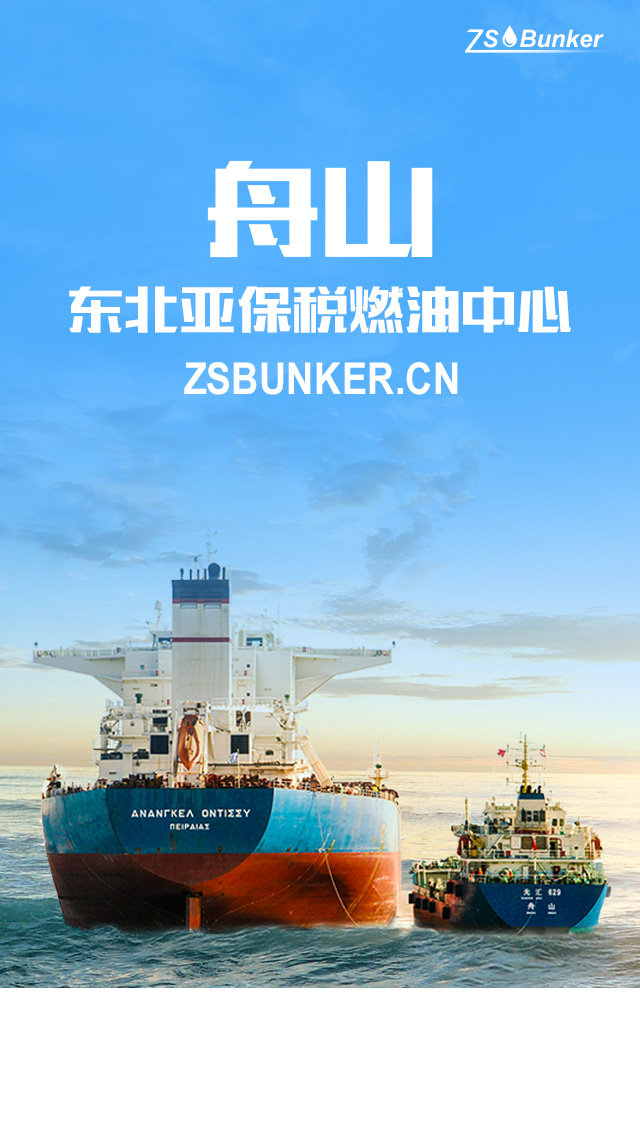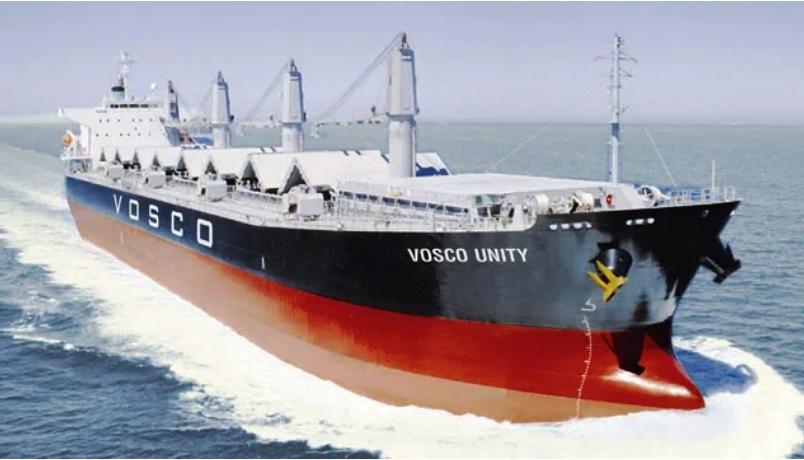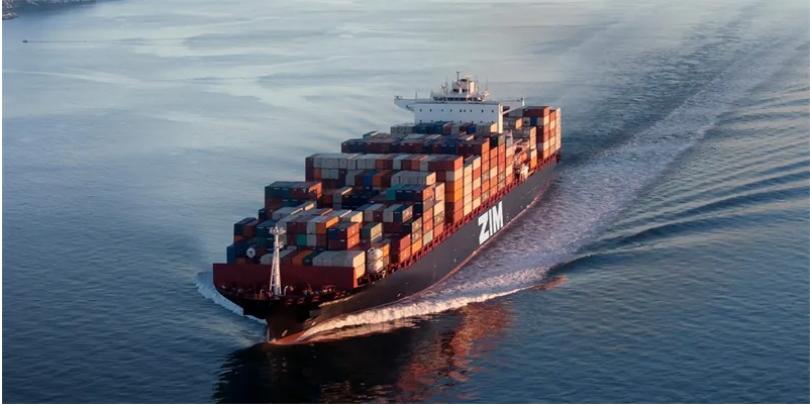【关键词】港口使费、安全港口、索赔、Remote
近期碰到一争议,承租人安排G轮到北仑港卸货,但由于船舶起锚的时候发现锚链被缠绕,导致靠泊计划被取消;进而承租人代理要求出租人承担因为锚链收不起来而导致的所谓的额外损失,比如锚地费及移泊费。
众所周知,对于G轮这种大型的散货船而言,如果无靠泊计划,需先在北仑外头的虾峙门锚地抛锚等泊。对于有吃水限制的大型船舶,往往无法从虾峙门锚地直接起锚靠泊北仑,需先移到内锚地,然后等待合适潮水再择机靠泊。
现在来看看发生该争议的基本情况。G轮的初始靠泊计划,代理18日发的电邮如下:可以看出船需19日先移到内锚地,然后20日一早再上引水靠泊。
Please kindly be advised that as per port arrangement, our vessel’s berthing schedule has been fixed below
POB :1050lt/19th Feb
Shift toinner anchorage: 1400lt/19th Feb
POB at inner anchorage:0645lt/20th Feb
ETB:0745lt/20th Feb # OreTerminal No.2
19日约1341代理又发了更新的靠泊计划:
Please be kindly advised that your good vessel shifting/berthing schedule as
follows:
0900/20 Shifting to beilun inner anchorage no.6
1300/20 Leave inner anchorage
1400/20 ETB at beilun iron ore terminal berth no.2
Remark: fygxiazhi channel closed from 2310/18 due to dense fog.
代理在19日1530左右给G轮船长发了靠泊指示,其中部分内容如下:
Dear Captain:
Pls kindly note that your good vessel is scheduled to berth at Ore
terminal NO. 2 at 1400hrs 20th/Feb(tomorrow),POB at Racon "Z" at 1100hrs 20th/Feb. pls pass the shallow water from 0945hrs---1045hrs 20th/Feb(pls do not be early or late than this passing schedule, which may cause cancellation):
20日一早,船长在起锚的时候,发现锚被锚链缠绕,导致收不起来,于是通知代理锚收不起来,无法在11点抵达接引水的位置,代理于是取消靠泊计划;随后安排别的船靠泊。
最终的靠泊报,21日从虾峙门移到北仑内锚地,22日靠泊,23日卸完货移到内锚地。
Please be kindly advised that your good vessel arrival report schedule as
follows:
0612/16 E.o.s.p.
0823/16 Dropped anchor & N.o.r tendered
0748/20 anchor up
1123/21 POB at xiazhi anchorage
1526/21 Dropped anchor at beilun inner anchorage no.6
0739/22 POB
0800/22 Left inner anchorage
0900/22 first line
1000/22 made all fast at beilun iron ore terminal berth no.2
2030/22 leave beilun iron ore terminal berth no.2
2130/23 shift to beilun inner anchorage no.4
Arrivaldraft:18.52 /18.51 fo:1452.2 do:131.7 fw:376
代理随后发了一电邮如下,声称因为锚收不起来,给他们造成了额外的损失,因此这些额外的费用得出租人来承担。
Good day,here is the additional cost for anchor chain.
1.shiftingcharge 0.22*NRT*1.45+0.22*NRT*1.9=50669.487rmb
2.Ferry Boat3000*4=12000
3.Anchorage dues 0.05*NRT*3=10312.65
total is72982.137rmb
pls kindly arrange the payment to our bank before dep, our bank detail is attached
代理与承租人均声称此费用得出租人额外承担,理由是:如果没有发生锚缠绕的事情,那么船在20日就可以直接从虾峙门移到北仑内锚地,然后直接靠泊,因此没有额外的移泊费用及锚地费用,小艇费等等。代理试图转嫁此费用到承租人身上是否理由充分及正当呢?
笔者从以下三个方面分析来说明这一问题。
一、港口安全问题
参之前与港口安全相关的系列文章,《浅析安全港口的定义及实例分析》、《浅析船舶不能安全离开的港口安全问题》及《再论安全港口问题》,可以知道如果没有异常情况发生,虽然有良好的船舶驾驶技术仍不能安全地驶入、挂靠及离开一个港口,这该港口(包括泊位,航道,锚地等等港口辖区)对于特定的船舶特定的航次而言是不安全的。
Sellers勋爵在 Leeds Shipping VScoiete Francaise Bunge (The Eastern City) [1958] 2 Lloyd’s Rep 127案中,在第131页判决书中说到:
If it were said that a port will not be safe unless, in the relevant period of time, the particular ship can reach it, use it and return from it without, in the absence of some abnormal occurrence, being exposed to danger which cannot be avoided by good navigation and seamanship, it would probably meet all circumstances as a broad statement of the law. Most, if not all,navigable rivers, channels, ports, harbours and berths have some dangers from tides,currents, swells, banks, bars or revetments. Such dangers are frequently minimized by lights, buoys, signals, warnings and other aids to navigation and can normally be met and overcome by proper navigation and handling of a vessel in accordance with good seamanship.
即通常很多人援引的如下措辞:
A port will not be safe unless, in the relevant period of time, the particular ship can reach it, use it and return from it without, in the absence of some abnormal occurrence, being exposed to danger which cannot be avoided by good navigation and seamanship.
很少人去注意如前述标黄色部分“some dangers from tides, currents, swells, banks, bars or revetments.”,这里说一些危险也来自潮水,流,涌,岸边,浅滩或护波堤;因此一个港口中的潮水,流,涌浪也能造成港口不安全。
现在来看看G轮当时抵达抛锚后,AIS显示的船位轨迹图,如下:可以看出轨迹圈范围很大,南北约1海里,东西约0.5海里;船舶在停泊的4天多时间里不停地绕着中心转圈圈,比较有规律性,轨迹近似一个圆形。在抛锚的情况下,主机停车,因此船舶发生这些轨迹变动的唯一原因是受到不定向的流或浪或涌的影响;重载情况下受风的影响较小,当然强风的情况下除外。如果轨迹都是通一个方向,说明这几个因素(流或浪或涌)的综合结果维持稳定,使船舶能始终保持一个方向。
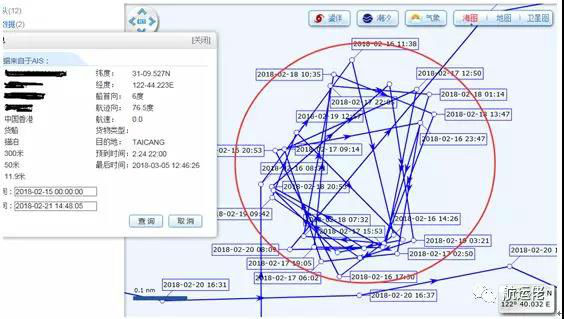
但如果经常变换,则导致了这种绕圈圈的情况发生。那么这种绕圈圈所导致的风险是什么?是否容易导致锚链缠绕呢?参锚链缠绕的图片如下:
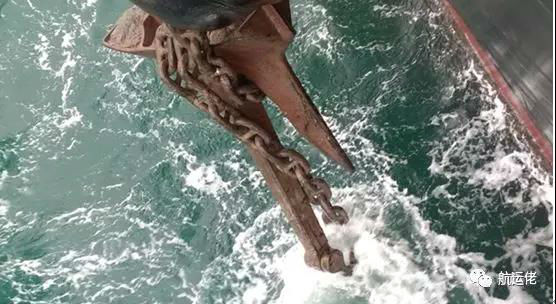
笔者认为,不定向的流或浪或涌的综合作用导致了发生锚链缠绕的可能性。这种缠绕的样子,很可能是船舶在绕圈的过程中导致的,锚链在海底拖拽的过程中直接挂上了猫爪。
参Roskill勋爵在The “ Hermine” 案中的如下说法:
…It is now quite unnecessary, in these unsafe port or unsafe berth cases, to refer back to the multitude of earlier decisions…There is the law clearly stated. What has to be determined by the tribunal of fact in each case is whether, on the particular facts, the particular warranty of safety has or has not been broken.
现在,在这些不安全的港口或不安全的泊位案件中,现在完全没有必要重新回顾以前的众多判决,已经有明确的法律规定。事实上仲裁庭在每种情况下必须确定的是,在具体事实上,特定的安全保证是否已经被破坏。
G轮的情况就是,在外界因素的作用下,尤其是不定向的流或浪或涌的影响,导致了锚链缠绕,从而导致了船舶不能安全使用及离开此锚地,承租人港口安全保证已经被破坏,承租人违约。那么承租人因自己违约而造成的所谓的额外的损失都得自己承担,包括时间损失正常计算laytime。代理反过来找出租人索赔损失,且不说出租人和当地代理没有直接委托合同关系,就因为所谓的额外的损失是由于承租人违约造成的,那么也应该找承租人索赔损失。
二、港口使费
关于港口使费,可以参《Time Charter》-Chapter 12,12.14:
12.14 Port charges include all charges which a ship has to pay before she leaves a port, even if some of those charges relateto benefits which will accrue to the ship only after she has left the port.
The charterers of the Apex were obliged by a special clause to pay the port chargesat Deptford if they ordered the ship to discharge deck cargo there, which theydid. The port charges payable at Deptford included Trinity House dues inrespect of lights to be passed during the remainder of the voyage to Leith where the under deck cargo was to be discharged.Had the ship gone straight to Leith withoutcalling at Deptford these dues would have been payable by the owners. Mathew, J., held that the charterers were responsible for these dues. He said: “The ordinary meaning of the phrase seems to me to be those charges which a vessel must pay before she leaves a port.” Newman & Dale v. Lamport & Holt [1896] 1 Q.B. 20.
港口费用包括船舶在离开港口之前必须支付的所有费用,即使这些费用中的一部分与船只离开港口后产生的利益有关。在Mathew法官看来,港口费用是那些船舶在离开港口之前必须支付的费用。此解释也为港口费用的权威解释。
也可参BIMCO关于标准港口使费的定义,其主要组成部分如下:
Harbour Dues 锚地费
Light Dues 灯塔费
Pilotage 引水费
Towage 拖轮费
Mooring/unmooring系缆/解缆费
Shifting 移泊费
Customs charges 海关费
Launch/car hire 小艇/小车费
Agency remuneration 代理费
Telex,postage,telegrams 电传费,邮寄费,电报费
代理所声称的锚地费及小艇费,从内锚地移到泊位的费用,这些很显然属于BIMCO关于港口使费的分类标准。其次如果代理声称在离港前必须支付,那么也符合Mathew法官对于港口使费的权威定义:那些在船舶离港前必须支付的费用为港口使费。
承租人声称是由于船舶的缺陷导致的,那么参合同相关 条款:
Vessel Deficiencies
In the eventof a loss of time during loading or discharging operations due to a defect,deficiency or default of the Vessel or its equipment, or attributable to thefault of the Vessel's Master or crew, any time lost will not count as laytimeor time on demurrage, even if Vessel is on demurrage.
All costsand expenses incurred as a result of any such defect, deficiency or default will be for Owner’s account.
该条款只是说在装卸货作业的过程中发生的船舶缺陷,比如机器故障导致舱盖打不开,或者压载水等排不出去,那么这类因出租人方面的原因造成了损失,则出租人承担。即使锚链缠绕如承租人声称的属于船舶缺陷,那么并非发生在装卸货作业过程中,而是发生在锚地。就算承租人声称发生在锚地也可引援该条款,损失的出租人来承担,那么依据合同条款如下:
DISCHARGE RATE 30,000 MT SHINC 24 HRS TT USCATUTC WITH USD 120,000 FOR ONE (1) AND USD 170,000 FOR 2 (TWO) DISPORT(S) GUARANTEED - WHICH SHALL BE A LUMPSUM DEDUCTION FROM INITIAL FREIGHT WITH NO PRESENTATION OF ACTUAL VOUCHERS. DISPORT D/A COSTS TO BE REVIEWED QUARTERLY IN GOOD FAITH TO STAYINLINE WITH PREVAILING MARKET CONDITIONS/INDUSTRY STANDARDS.
很显然,港口使费属于包干形式,承租人已经保证了港口使费一港不超12万,两港不超17万,即任何超出此数额的,出租人无需承担。在靠泊过程中使用几条拖轮,多少马力,几个引水,是否需要从外锚地先移到内锚地,然后从内锚地再移到泊位,这些和出租人都没有关系,如何安排及风险都在承租人自己;不管最终的费用多少,出租人最大的义务是支付一港12万,两港17万。
承租人可能声称两个条款有冲突,但笔者认为并没有冲突,额外的手打的条款是对合同打印条款的补充。双方再次强调了,对于港口费用的责任:承租人保证一个港的港口使费最多12万,两港17万,这些费用从运费中直接扣除。与合同机打条款说由于出租人方面的原因导致的费用由出租人来承担并没有冲突,这些费用确实是出租人承担,因为所谓的费用均属于港口使费,而出租人已经支付了(承租人从运费中扣除)港口使费。
如贵族院判例,The “Laura Prima”[1982] 1 Lloyd’sRep.1案中,Roskill勋爵认为合同中第6条的NOR递交条款中的最后一句措辞“for any reason over which charterers has no control, such delay shall not count as used laytime.”与第9条的“reachable on her arrival”并不冲突,恰当的理解是另一方的互补。因此G轮的合同,承租人保证了最大的港口使费数额,与港口使费由出租人承担这两条款直接也并不冲突,前者是后者的补充,承租人的一个额外的保证。
如果承租人想把此额外的费用转嫁到出租人身上,那么必须如其它合同条款作如下下标黄色的部分,作额外的补充,明确说明,任何额外的费用不得构成港口使费的一部分。当然如下条款所说的移泊仅仅限于泊位与泊位之间或港口之间;没有说明包括锚地和泊位这种移泊。因此签此条款的意图应该理解为有额外的强制移泊的费用由出租人承担,不包括G轮中所说的从锚地移到泊位之间正常的移泊费用。
ShiftingCost and Time
If more thanone berth at any one loading/discharging port has been agreed, shifting costsincluding bunkers consumed will be for the Owner’s account and time used willnot count as laytime or time on demurrage.
If more thanone anchorage has been agreed or is customarily used in order for the Vessel toreach the loading/discharging berth, shifting costs including bunkers consumedwill be for the Owner’s account and time used will not count as laytime or timeon demurrage. If more than one anchorage point has not been agreed or if theshifting between anchorage points does not bring the Vessel geographicallycloser to the loading/discharging berth, the exclusions in this subclause willnot apply. If the Owner, Master or Port Authority orders the Vessel outanchorage for any reason, time will stop counting, even if the Vessel is ondemurrage, at the time of the order until the Vessel is again at anchorage andall costs associated with the shift shall be for Owners’ account and shall be additional to and shall not form part of any capped port DA.
The Vesselmust be in seaworthy trim for shifting between berths and ports.
If theOwner, Master or Port Authority orders the Vessel out of a berth for anyreason, time will stop counting, even if the Vessel is on demurrage, at thetime of the cessation of loading/discharging until the Vessel is again in berthand ready to resume loading/discharging and all costs associated with the shiftshall be for Owners’ account and shall be additional to and shall not form part of any capped port DA.
即使承租人认为有此措辞的保护,额外的费用,比如所谓的锚地费用,承租人可以转嫁到出租人身上(锚地费为港口使费)。但是,所谓的从内锚地再移到泊位的费用,代理及承租人无权转嫁到出租人身上。此类费用为不可预测的,过于遥远,承租人无权找出租人索赔。
三、损害索赔的遥远性
首先需明确的是,在承租合同下,因外界因素引起的收不起锚并不会导致船舶初始递交的NOR无效,除非承租人能证明,在船长在递交NOR的时候,船舶不属于事实上的准备就绪或者未抵达合同指定的位置。G轮的代理曾让船长重新递交NOR,并且曾坚持在NOR上批注NOR无效的字样。笔者想指出的是,NOR有效与否接受与否,得看合同条款,代理不是合同方,因此船长大可拒绝代理添加任何此类的批注。关于NOR有效性的问题不在此讨论,可以参之前的系列文章。
其次,在承租合同下,如果无相反规定,那么除非合同要求出租人在抵达装卸港必须递交NOR,否则出租人如果财大气粗,完全可以不递交NOR;递交NOR仅仅是出租人的选择权。反之,承租人的责任义务也仅仅在收到船长递交的NOR的时候开始;在没有收到NOR之前,承租人没有义务开始准备货物或者准备接收货物。
在船舶抵达锚地船长递交NOR之后,船舶已经结束了空载或者重载航次,之后因外界的原因导致锚链缠绕,这与船舶的适航性无关;因此倘若承租人声称出租人违约,违反船舶的适航性将不成立。此外出租人并未在合同中作此类的保证,例如出租人保证不发生丢锚,或者保证不发生锚链缠绕。假如出租人作了这类保证,那么如果违反,承租人将有可能有权利找出租人索赔损失,但这些损失也仅限于在签订合同的当时,可以预料的损失;承租人无权索赔那些遥不可及的损失。
关于违约所造成的损害赔偿的遥远性(remote)原则,参被引援次数非常多的著名先例,Hadley v. Baxendale (1854) 9 Ex. 341案。该案的基本情况是,因机器轴承损坏,造成原告的工厂停产;原告委托被告(船东)运送此轴承到某地,让厂家再做一根新的。结果因为被告船东延误,导致了新的轴承比计划晚了好几天才运送到原告手中。原告因此找被告索赔因延迟所造成,早点开工可以赚取到的利润损失。法院认为:延迟运送轴承给原告造成的未赚取的利润损失是被告无法合理预见的,被告并不知道原告没有备用的轴承,更不知道延误会带来停产停工。
Baron Alderson法官在判决中说到:我们认为目前适当的规则是这样的,如果双方签订了其中一方违约的合同,另一方应该就这种违约行为应得到的损害应该是公平的并且合理地被认为是自然地(即根据事物的通常过程)从这种违反合同本身引起的,或者在他们签订合同时可以合理地认为都在双方的意料之中,作为违反它的可能结果。现在,如果原告向被告传达并由双方知晓的合同实际发生的特殊情况,他们合理意料的违反合同的损害将是在通常所知和传达的特殊情况下违反合同通常会造成的伤害。但另一方面,如果这些特殊情况对于违约方来说完全是未知的,那么他最多只能在他的沉思中考虑一般会出现的伤害的数量,而在众多案件不受任何特殊情况下的这种违约行为的影响。对于这种损失,在普通情况下发生的大量此类案件中,既不会因违反合同而自然流露,也不会由于这种特殊情况而导致违约的合理和自然的后果,传达给被告或被告知。因此,法官应该告诉陪审团,在摆在他们面前的丰满的事实前,他们根本不应该在估计损失时考虑利润损失,因此本案必须重新审判。
Now we think the proper rule is such as the present is this: Where two parties have made a contract which one of them has broken, the damages which the other party ought to receive in respect of such breach of contract should be such as may fairly and reasonably be considered either arising naturally, i.e., according to the usual course of things, from such breach of contract itself, or such asmay reasonably be supposed to have been in the contemplation of both parties,at the time they made the contract, as the probable result of the breach of it.Now, if the special circumstances under which the contract was actually made where communicated by the plaintiffs to the defendants, and thus known to both parties, the damages resulting from the breach of such a contract, which they would reasonably contemplate, would be the amount of injury which would ordinarily follow from a breach of contract under these special circumstances so known and communicated. But, on the other hand, if these special circumstances were wholly unknown to the party breaking the contract, he, at the most, could only be supposed to have had in his contemplation the amount of injury which would arise generally, and in the great multitude of cases not affected by any special circumstances, from such a breach of contract. For such loss would neither have flowed naturally from the breach of this contract in the great multitude of such cases occurring under ordinary circumstances, nor were the special circumstances, which, perhaps, would have made it a reasonable and natural consequence of such breach of contract, communicated to or known bythe defendants. The Judge ought, therefore, to have told the jury, that, upon the fats then before them, they ought not to take the loss of profits into consideration at all in estimating the damages. There must therefore be a new trial in this case.
在该案判决之后,与违约损害赔偿有关的判定通常分为了两种,第一种是一般损失,就是毁约会自然而然地造成可预见性的后果,这种情况下损害赔偿可追偿,即违约方要赔偿;第二种是特别损失,就是毁约所带来的不可预见性的后果,除非在订约的当时已经明确告诉对方,并在对方同意,否则不可追偿。
在Victoria Laundry v. Newman Industries (1949) 2K.B. 528案中,对Hadley v. Baxendale案的两条损失原则加以分析,列出著名的六项大原则,如下:
(1) It is wellsettled that the governing purpose of damages is to put the party whose rights have been violated in the same position, so far as money can do so, as if his rights had been observed: Sally Wertheim v. Chicoutimi Pulp Co.(1911) A. C.301. This purpose, if relentlessly, pursued, would provide him with a complete indemnity for all lose de facto resulting from a particular breach, however improbable, however unpredictable. This, in contract at least, is recognized as too harsh a rule.
(2) In cases of breach of contract the aggrieved party isonly entitled to recover such part of the loss actually resulting as was at the time of the contract reasonably foreseeable as liable to result from the breach.
(3) What was at that time reasonably so foreseeabledepends on the knowledge then possessed by the parties or, at all events, bythe party who later commits the breach.
(4) For this purpose, knowledge “possessed” is of two kinds; one imputed, the otheractual. Everyone, as a reasonable person, is taken to know the “ordinary course of things” and consequently what loss is liable toresult from a breach of contract in that ordinary course. This is the subjectmatter of the “first rule” in Hadley v. Baxendale…But to this knowledge which a contract–breaker is assumed to possess whetherpossesses it or not, there may have to be added in a particular case knowledgewhich he actually possesses, of special circumstances outside the “ordinary course of things” of such a kind that a breach in those specialcircumstances would be liable to cause more loss. Such a case attracts theoperation of the “second rule”so as to make additional loss alsorecoverable.
(5) In order to make the contract–breaker liable under either rule it is notnecessary that he should actually have asked himself what loss is liable toresult from a breach. As has often been pointed out, parties at the time ofcontracting contemplate not the breach of the contract, but its performance. Itsuffices that, if he had considered the question, he would as a reasonable manhave concluded that the loss in question was liable to result…
(6) Nor, finally, to make a particular loss recoverable,need it be proved that upon a given state of knowledge the defendant could, asa reasonable man, foresee that a breach must necessarily result in that loss.It is enough if he could foresee it was likely so to result. It is indeedenough, …if the loss(or some factor without which it would not have occurred) is a “serious possibility” or a “real danger”. For short, we have used the word “liable” to result. Possibly the colloquialism ‘on the cards’ indicates the shade of meaning with someapproach to accuracy.
在《Chittyon Contracts》26-111中提到到了该案中第2,3,4个观点。这里指出受害方如果可以向违约方索赔全部损失,包括一些极不可能与估计不到的损失,会带来很苛刻的后果。如果违约,受害方只能去索赔与追偿在订约时可以合理预见的由于违约带来的损失部分。很显然,船舶因为锚链收不起来而导致延误是不可预见的偶然事件。除非合同以异常清晰明确的措辞来说明,不然这类因为锚收不起来所导致的可能需要移到内锚地或者不能直接马上靠泊的损害索赔都可归于太过遥远的损害赔偿remotenessof damages,承租人无权索赔此类损失。
商事法院的Robert Goff法官在The “Pegase” [1981] 1 Lloyd’s Rep.175案中,在第182页判决书中说到:这一原则声明曾被广泛理解为包含两个“规则”,第一条规则涉及自然发生的损害赔偿,即按照通常的情况,第二条规则涉及损害赔偿,在合同制定时各方的预期中。此外,第二条规则的适用被理解为取决于特定情况的了解,这些特殊情况不仅仅是在合同订立时或之前由原告传达给被告的,但是这样传达以致被告通过签订合同明确或暗示承担由于这种特殊情况而产生的损失风险。
This statement of principle was at one time widely understood to embrace two "rules", the first rule being concerned with the recovery ofdamages arising naturally, i.e., according to the usual course of things, andthe second rule being concerned with recovery of damages within thecontemplation of the parties at the time when the contract was made.Furthermore, the application of the second rule was understood to be dependentupon knowledge of special circumstances which had not merely been communicated by the plaintiff to the defendant at or before the time when the contract was made(a requirement which is consistent with one reading of the succeeding passage in Baron Alderson's judgment), but had been so communicated that the defendant,by entering into the contract, assented expressly or impliedly to assuming therisk of loss flowing from such special circumstances.
在Jackson & Anor v. Royal Bankof Scotland [2005] UKHL 3案中,贵族院的Hope of Craighead勋爵在第25段判决中说到, Hadley v. Baxendale案的原则,为每个合同法的学生所熟悉并默诵于心,并再次引援了Baron Alderson法官所说。
The way in which the Court of Appeal dealt with the case suggests it misunderstood the effect of the rules that were identified inHadley v. Baxendale (1854) 9 Exch 341,354. They are very familiar to every student of contract law. Most would claim to be able to recite them by heart. But it may be helpful, asbackground to the discussion that follows, if I were to set out the rules again here:
"Where two parties have made a contract which one of them has broken,the damages which the other party ought to receive in respect of such breach ofcontract should be such as may fairly and reasonably be considered eitherarising naturally, ie according to the usual course of things, from such breachof contract itself, or such as may reasonably be supposed to have been in thecontemplation of both parties, at the time they made the contract, as theprobable result of the breach of it."
The first rule,prefaced by the word "either", is the rule that applies in this case.It is the ordinary rule. Everyone is taken to know the usual course of thingsand consequently to know what loss is liable to result from a breach of thecontract if things take their usual course. But the way the second rule isexpressed, prefaced by the word "or", shows the principle thatunderlies both limbs. It refers to what was in the contemplation of the partiesat the time they made their contract.
Hope勋爵认为,以“或者”开头的第一条规则是在这种情况下适用的规则。这是普通的规则,每个人都被理解为通常的事情过程,因此要知道如果事情按照惯例进行,违约会导致什么样的损失。但是第二条规则的表达方式,以“或”开头,表明了两规则下的原则,它指的是双方在签订合同时的所预期到的。
所预期到的违约所造成的后果指的是在签订合同的当时,而不是发生违约事件的时候。G轮争议也一样,所谓的损失如果可追偿,那么必须是在签订合同的当时就能够被当事人双方所预期到,而不是针对特定航次特定卸港-北仑而发生所谓的从外锚地移到内锚地,然后产生一个所谓的不能直接靠泊的额外的从内锚地移到泊位的费用。也即在签订租约的当时,可以预期到原本能够从外锚地直接靠泊北仑港,但一旦发生锚链缠绕则直接导致需要先移到内锚地,然后再从内锚地移到泊位靠泊,增加了额外的费用;很显然事实上这是不可预期的。
这个时间点的问题,可以参《Chitty on Contracts》:26-109,一个初步的观点是,当事人双方在签订合同的当事所预期到的问题,而不是他们在事后或违约的时候所预期到的。
26–109 Relevant date. A preliminary point is that the question is what was contemplated by the parties at the time at which the contract was made, not what they may have contemplated at some later date such as the date of breach.
在Czarnikow Ltd v. Koufos (The “Heron II”)案中,贵族院的Reid勋爵说到:我认为这不是意味着有两条规则,或者两条不同的标准或测试是适用的。关键的问题是,根据被告在合同签订时可以获得的信息,他应该或者其职位上的合理人员是否已经意识到这种损失很可能是违约造成的,认为损失自然流失,或者这种损失应该在他的意料之内。
I do not think that it was intended that there were to be two rules orthat two different standards or tests were to be applied. The last two passageswhich I quoted from the end of the judgment applied to the facts before theCourt which did not include any special circumstances communica- ted to thedefendants ; and the line of reasoning there is that because in the greatmajority of cases loss of profit would not in all probability have occurred, itfollowed that this could not reasonably be considered as having been fairly andreasonably contemplated by both the parties, for it would
not have flowed naturally from the breach in the great majority of cases.
I am satisfied that the Court did not intend that every type of damagewhich was reasonably foreseeable by the parties when the contract was madeshould either be considered as arising naturally i.e. in the usual course ofthings or be supposed to have been in the contemplation of the parties. Indeedthe decision makes it clear that a type of damage which was plainly foreseeableas a real possibility but which would only occur in a small minority of casescannot be regarded as arising in the usual course of things or be supposed tohave been in the contemplation of the parties: the parties are not supposed tocontemplate as grounds for the recovery of damage any
type of loss or damage which on the knowledge available to the defendant wouldappear to him as only likely to occur in a small minority of cases.
In cases like Hadley v. Baxendale or the present case it is not enough that in fact the plaintiff's loss was directlycaused by the defendant's breach of contract. It clearly was so caused in both.The crucial question is whether, on the information available to the defendant when the contract was made, he should, or the reasonable man in his position would, have realisedthat such loss was sufficiently likely to result from the breach of contract tomake it proper to hold that the loss flowed naturally from the breach or that loss of that kind should have been within his contemplation.
在The “Achilleas”[2007]1 Lloyd’s Rep. 19案中,商事法院的 Christopher Clarke法官在第27页判决中说到,事实上某种损失光是可以预见的,并不足以能够追偿,有些人可能会预见到一个非常遥远的后果;原告对于可以预见的,并且在绝大多数情况下会发生的可预见的结果有权追偿损害赔偿;或者就此被告所知悉或可得的事实而言,其发生的可能性远低于平均数,但发生率并非不寻常;另一方面尽管可预见的可能性很大,但只会在少数情况下发生,因此其发生情况非常不寻常,则原告无权追偿此损失。
45. I derive from Lord Reid’s speech the following propositions:
(a) The mere fact that a type of loss is foreseeable is not, of itself,sufficient to make it
recoverable; someone may foresee a result that is very remote.
(b) A claimant is, however, entitled to recover damages in respect of aforeseeable result which either
(i) will happen in the great majority of cases;
or (ii) in respect of which, on the facts known or available to thedefendant, the chances of its happening are considerably less than evens butthe occurrence of which would not be very unusual.
(c) But a plaintiff is not entitled to recover in respect of an occurrencewhich, although foreseeable as a substantial possibility will only happen in asmall minority of cases and whose occurrence would therefore be very unusual.
同理,G轮案中,租约签订的仅仅是到国内安全港口卸货,在签订租约的时候,出租人不可能预期得到某个航次承租人安排到北仑港卸货,会发生所谓的违约事件-锚链被缠绕,从而导致了不能一次性直接靠泊而产生所谓的额外的移泊费用。因此该索赔不可预见,承租人无权索赔。
在SC Confectia SA v Miss Mania Wholesale Ltd [2014] EWCA Civ 1484 案中,Beatson勋爵说到,The Achilleas案已经明确表明,Hadley v.Baxendale案所确立的原则仍然是现行的标准;该案是Hadley v. Baxendale案第二中情况下的一个案例。
Secondly, cases since The Achilleas havemade it clear that, while it applies beyond the context of shipping contracts,that Hadley v. Baxendale remains the standard rule and is grounded onpolicy. The standard rule can be displaced by an analysis based on the allocation of risk in the contract if, on examining the contract and thecommercial background, it can be said that the loss in question is within oroutside the scope of the contractual duties: see Supershield Ltd v. Siemens Building Technologies FE Ltd [2010] EWCA Civ 7.In this case, however, there is no evidence of practice about the effect of theinsolvency of sub-buyers so that the conditions for displacing the standardrule have not been satisfied.
Finally, TheAchilleas was a case about the second limb of Hadley v.Baxendale Here, it is common ground thatthis case has to be considered under the first limb, whether that ischaracterised as a loss which is foreseeable or a loss which is reasonablycontemplatable.
在The “Amer Energy”(2009) 1 Lloyd’s Rep 293案中,商事法院的Flaux法官他不认为贵族院在The “Achilleas”案中,有任何意图去作任何新的标准去改变Hadley v.Baxendale案所确立的违约损害索赔的原则。
For the reasons which follow, I am not so satisfied.First, I do not consider that the House of Lords (at least the majority oftheir Lordships) were intending to lay down some completely new test as torecoverability of damages in contract and remoteness different from theso-called rule in Hadley v Baxendale (1854)9 Exch 341 as refined in subsequent cases, above all the decision of the Houseof Lords itself in C Czarnikow Ltd vKoufos (The Heron II) [1967]2 Lloyd’s Rep 457; [1969] 1 AC350. See Lord Hope at paras 31 to 34, Lord Rodger at paras 47 to 52, LordWalker at paras 66 to 78 and Baroness Hale at paras 89 to 93. 18. To the extentthat Lord Hoffmann was purporting to lay down some new test as torecoverability of damages in contract, he was in a minority.
Although Lord Hope adopts a similar analysis at paras 30and 36, he does so essentially by way of application of established principles.In any event it is important to note that even Lord Hoffmann acknowledges inparas 9 and 11 of his opinion that departure from the normal principles offoreseeability would be unusual. Although he refers to shipping as a marketwhere limitations on the extent of liability arising out of generalexpectations in that market might be more common, I do not consider that he wasintending to say that in all shipping cases (as opposed to the type of timecharter case then under consideration) the rule in Hadley v Baxendale as subsequently refined, will no longerapply. If he was saying that, it was not a view shared by the majority and itwould be heterodox to say the least.
在Louis Dreyfus Commodities Suisse SA v MT MaritimeManagement BV [2015] EWHC 2505 (Comm)案中,关于损害赔偿的遥远性,高等法院的Males法官认为如果受到的损害太过遥远渺茫,也就是说不在合同订立时各方合理的预期范围内,则该损害赔偿不可追偿。因此传统上,当出现遥远性的争议时,问题是索赔的损失是否属于当事人合理预期内的某种或某类的损失。然而最近一种已经从遥远的原则发展出来,即使损失在各方的合理预期之内,也可能出现这样的情况,在相关的市场背景情况或一般理解表明,当事方不会被合理地视为要承担这种损失的责任。
Damages for breach of contract will not be recovered where the damage suffered is too remote, that is to say not within the reasonable contemplationof the parties at the time they made the contract: see Hadley v Baxendale (1854) 9 Exch 341and subsequent cases. Traditionally, therefore, when an issue of remoteness arises, the question has been whether the loss claimed was of a kind or type which would have been within the parties' reasonable contemplation: see The Sylvia at [23]. More recently,however, a principle of remoteness has been developed to the effect that evenif a loss is within the parties' reasonable contemplation, there may be casesin which "the context, surrounding circumstances or general understandingin the relevant market shows that a party would not reasonably have beenregarded as assuming responsibility for such losses": see The Achilleas [2008] UKHL 48,[2009] 1 AC 61 at[9].
在SiemensBuilding Technologies Ltd v Supershield Ltd[2010] EWCA Civ7案中,Toulson勋爵在第43段判决中说到,Hadley v Baxendale案的原则仍然是一个标准,但它已经被合理化。
Hadley vBaxendale a remains astandard rule but it has been rationalised on the basis that it reflects theexpectation to be imputed to the parties in the ordinary case, i.e. that acontract breaker should ordinarily be liable to the other party for damageresulting from his breach if, but only if, at the time of making the contract areasonable person in his shoes would have had damage of that kind in mind asnot unlikely to result from a breach. However, South Australiaand Transfield Shipping areauthority that there may be cases where the court, on examining the contractand the commercial background, decides that the standard approach would notreflect the expectation or intention reasonably to be imputed to the parties.
关于这个遥远Remoteness的解释,在《Chitty on Contracts》26-106,26-107中说到:有关遥远的损害的经典陈述可以在Hadley v Baxendale案的判决中找到,之后的案子对此进行了解释。通常情况下产生的损失可以归于Hadley v Baxendale案的第一条规则;可追偿的损失变得很普遍,被当事人双方所预期得到的归于第二条规则。在26-108中说到,这些案件的综合影响可以概括如下,如果在合同签订时(并且假定双方实际预见到了有关违约行为),那么该种类或类型的损失不是违反合同的太遥远的结果,这是在当事人合乎情理的预期中,这不是违约不可能的结果。必须记住的是,损失也可能无法追偿,如果仅仅是因为它不太常见,如果在这种情况下,无法合理地推定被告接受对此承担责任。
A type or kindof loss is not too remote a consequence of a breach of contract if, at the timeof contracting (and on the assumption that the parties actually foresaw thebreach in question), it was within their reasonable contemplation as a notunlikely result of that breach. It must be borne in mind that a loss may not berecoverable merely because it was not too unusual, if in the circumstances itwas not reasonable to assume that the defendant was accepting responsibility for it.
在26-119中关于实际了解特殊情况中说到,Hadleyv Baxendale案所谓的第二条规则适用于违反特定合同产生的损失(“类型或种类的损失”)大于或不同于正常情况下的损失。如果依靠对被告(承诺人)的实际了解,使他对在特殊情况下因违反合同而导致的特殊损失承担责任,则该知识必须在合同订立时或之前存在。在现有的贵族院的权威中,Hadley v Baxendale案的两条规则并不相互排斥。事实上,第一条规则中有哪些类型的损失,以及如果在第二条规则范围内,哪些类型的损失只能根据相关的违约情况如何表征以及对各方假定情况的了解程度来确定。第二条规则涵盖主要的损害赔偿,而不是损失的程度或范围;因此,当事人没有必要预期到损害的程度或损失程度,只要它属于预期的损失类型即可。
26–119 Actualknowledge of special circumstances.
The so-calledsecond rule in Hadley v Baxendale applies when the loss (the ‘‘type or kind of loss’’) flowing from the breach ofa particular contract is greater than, or different from what it would havebeen in normal circumstances. If actual knowledge of the defendant (thepromisor) is relied upon to make him liable for exceptional losses resultingfrom breach of the contract in the special circumstances, that knowledge musthave existed at or before the making of the contract.There is now authority inthe House of Lords that the two rules in Hadleyv Baxendale are not mutually exclusive; indeed, what kinds of loss arewithin the first rule and what kinds are only recoverable if within the secondrule depends on how the relevant breach of contract is characterised and thedegree of knowledge of the circumstances that the parties are assumed to have.The second rule covers ‘‘heads of damage’’ not the quantum or extent of loss;thus, it is unnecessary for the parties to have contemplated the quantum of damages, or the extent of the loss, provided it falls within a contemplated type of loss.
然而当事方的被告可能不会仅仅因为他已经以纯粹随意的方式了解了这种不寻常的风险而承担责任。尽管在Hadley v Baxendale案中,沟通被认为是至关重要的因素,但来自陌生人第三方的偶然交流是不够的。关键是应由申诉人或代表申诉人向被告或其代理人通报特殊情况,以表明申诉人认为被告知道履行合同有哪些其他事项是重要的;这些事实可能会在适当的情况下推论被告作为一个合理的人正在接受索赔人遭受特殊损失的风险。
而对不正常损失承担责任的问题,如果根据他对特殊情况的了解,被告在合同签订时的立场中的合理人员会理解,在这种情况下作出承诺,他就承担了remoteness损害的责任的风险。不确定的是,一旦被告有了必要的知识,他是否仍然可以否认责任,理由是他认为责任是不合理的因此拒绝接受。也有法官认为,充分的知识足以使被告承担责任,除非他有效地将其责任排除在合同条款之外。例如在依赖特殊情况的情况下,假设是被告承诺承担任何特殊情况下的特殊损失。但是如果被告没有承诺,那么对这种特殊情况的下特殊损失将不承担责任。同时如果造成损失的情况越不寻常,损失程度越大,被告合理地被视为承担责任的可能性就越小。
结合这些先例,Hadley v Baxendale案所确立的违约的损害赔偿规则仍然是现行的标准。受害方如果可以向违约方索赔全部损失,包括一些极不可能与估计不到的损失,会带来很苛刻的后果。因此只有在签约当时,可以被当事人双方合理预期到的,违约会自然而然地造成可预见的后果,此种情况下的损失才可追偿。但如果违约所带来的损害太过遥远渺茫,在签订合同的当时不在当事人合理的预期范围内,这种特殊情况下的特殊索赔将不可追偿。
因此, G轮锚链缠绕的事件,就算倘若承租人声称构成违约,但这种违约所造成的不能直接从外锚地直接靠到泊位,是在合同签订当时无法预期到的(通常情况下需先移到内锚地),所谓的损害太过遥远,因此不可追偿。除非是在合同中,出租人已经明确承诺,如果因为船舶方面的原因导致了不能直接从外锚地靠上泊位,出租人承担额外的从内锚地移到泊位的时间及费用,否则依据前文所述这些权威,此索赔必然过于遥远而不成立。但如果在港口使费包干的情况下,让出租人来确认承担从内锚地再移到泊位的费用,出租人也必然不会同意此合同条款。
最后以Reid勋爵在贵族院判例The “Heron II”案中所说的作为全文结尾:
In contract, if one party wishes to protect himself against a risk which to the other party would appear unusual, he can direct the other party’s attention to it before the contract is made, and I need not stop to consider in what circumstances the other party will then be held to have accepted responsibility in that event.
在合同中,如果一方希望保护自己免受在另一方看似不寻常的风险,他可以在合同制定之前引导对方的注意力,我不必停下来考虑对方在什么情况下,将被认为在该事件中已经同意承担了责任。
海运圈聚焦专栏作者 Alex (微信公众号 航运佬)

 2018-03-07
2018-03-07 1993
1993 





